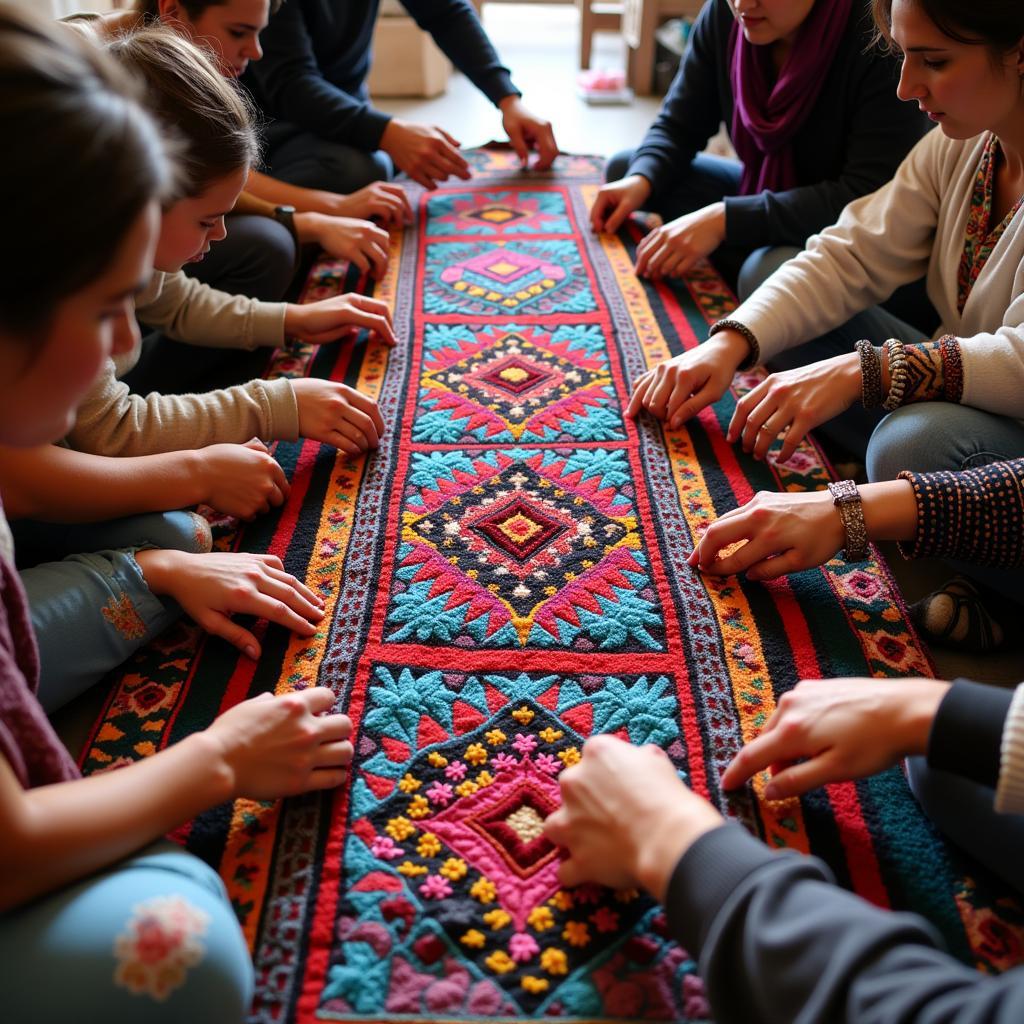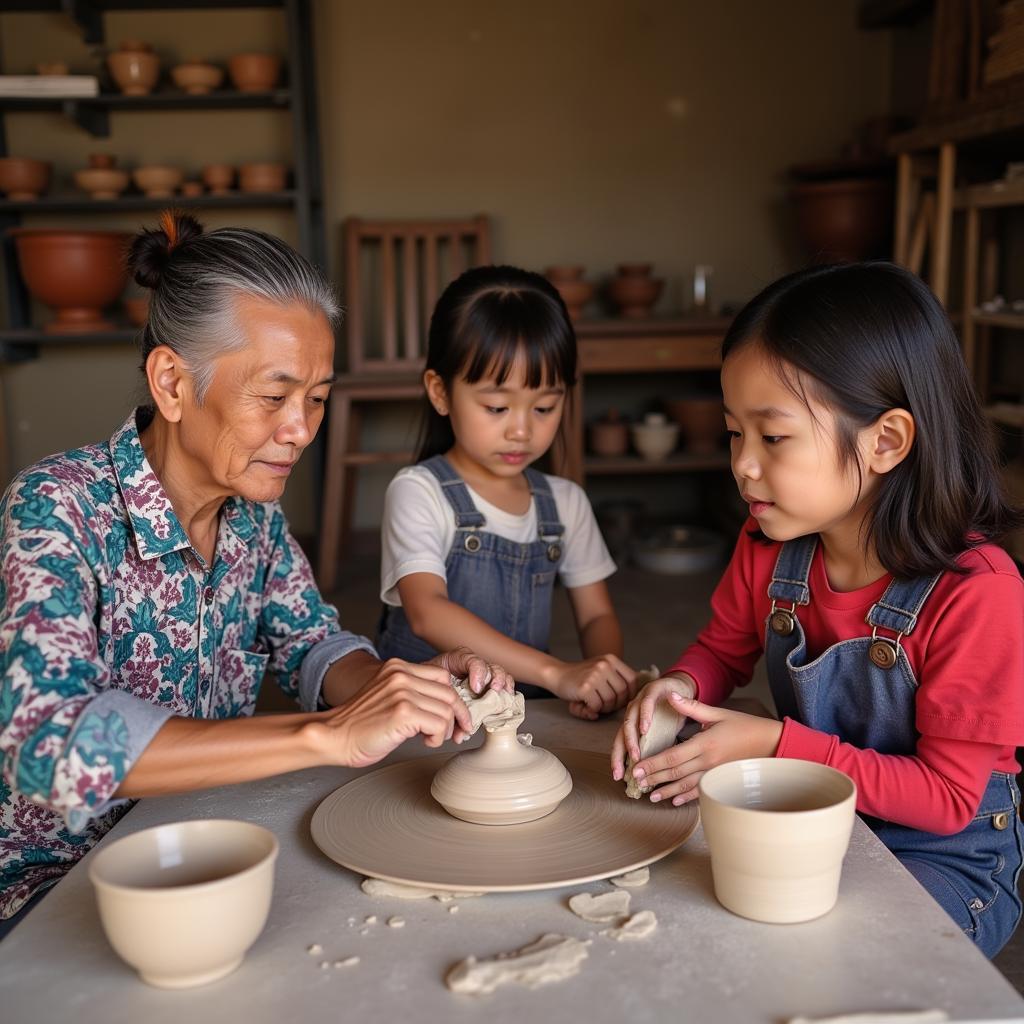From the intricate tapestries woven in the heart of Morocco to the hand-carved wooden toys passed down through generations in the Andes, artisan crafts embody the soul of a culture. But beyond their aesthetic beauty and cultural significance, “artisan societies” represent something much deeper: a universal language of creativity, skill, and human connection that transcends borders and builds bridges of understanding between even the most disparate cultures.
 Moroccan Artisans Weaving a Tapestry
Moroccan Artisans Weaving a Tapestry
The Universal Language of Craft
For centuries, artisan communities around the world have served as vital cultural hubs, fostering a sense of shared identity and pride. The act of crafting itself, whether it be pottery, woodworking, or textile work, requires patience, dedication, and a deep respect for tradition. This shared pursuit of excellence creates a common ground that allows artisans from different backgrounds to connect on a fundamental level. The Putnam County Historical Society offers a fascinating glimpse into how craft traditions have evolved over time, reflecting the changing social and economic landscapes of different communities.
Consider the intricate patterns of a Persian rug, hand-knotted by skilled artisans over countless hours. Each knot represents not just a technical skill, but a piece of their cultural heritage, passed down through generations. When someone across the world, perhaps unfamiliar with Persian history or customs, marvels at the rug’s beauty, a connection is made. The artisan’s dedication to their craft has sparked a moment of appreciation, fostering a sense of shared humanity.
Preserving Traditions, Empowering Communities
In a rapidly globalizing world, artisan societies play a crucial role in preserving cultural heritage. As younger generations become increasingly influenced by global trends, traditional crafts often face the risk of being forgotten. By supporting artisan societies, we contribute to the preservation of these invaluable cultural treasures, ensuring that future generations can connect with the wisdom and artistry of their ancestors.
 Artisan Teaching Pottery to Children
Artisan Teaching Pottery to Children
Beyond cultural preservation, artisan societies often serve as vital economic engines for their communities, particularly in developing countries. By providing artisans with a platform to showcase and sell their work, we empower them to achieve financial independence and support their families. This economic empowerment not only improves individual livelihoods but also strengthens communities and contributes to a more equitable world. The Society of American Travel Writers often highlights the positive impact of ethical tourism on artisan communities, encouraging travelers to seek out authentic, locally made crafts.
Bridging Cultures in a Digital Age
In today’s digitally connected world, the internet has emerged as a powerful tool for connecting artisan societies with a global audience. Online marketplaces and social media platforms allow artisans to showcase their work to a wider customer base, transcending geographical limitations. This increased visibility not only creates new economic opportunities but also fosters cross-cultural dialogue and appreciation.
For example, imagine a young artist in rural India, skilled in the ancient art of block printing, who can now connect with customers in Europe or North America through an online platform. This interaction not only generates income for the artist but also exposes the world to the beauty and artistry of Indian block printing, fostering a greater understanding of Indian culture.
Building a More Peaceful World, One Craft at a Time
The simple act of appreciating a handmade object from another culture can plant the seeds of empathy and understanding. When we recognize the skill, patience, and cultural heritage embedded in each piece, we begin to see beyond cultural differences and appreciate the shared humanity that unites us all.
“When we engage with artisan crafts, we are not just buying objects; we are investing in cultural preservation, economic empowerment, and ultimately, a more peaceful and interconnected world.” – [Dr. Anya Sharma, Anthropologist and Cultural Heritage Specialist]
By supporting artisan societies, promoting their work, and fostering cross-cultural dialogue, we can build a world where creativity and cultural expression become powerful forces for peace, understanding, and unity.
FAQ
-
How can I support artisan societies? You can support artisan societies by purchasing fair-trade crafts, donating to organizations that promote artisan work, and spreading awareness about the importance of cultural preservation.
-
Where can I find authentic artisan crafts online? Many reputable online marketplaces specialize in selling fair-trade, handmade goods from around the world.
-
What is the significance of cultural heritage? Cultural heritage encompasses the traditions, customs, and artistic expressions passed down through generations, shaping a community’s identity and values.
-
How does supporting artisan societies contribute to peacebuilding? By promoting cross-cultural understanding and appreciation, supporting artisan societies helps break down stereotypes and build bridges between different communities.
-
What are some examples of traditional crafts from around the world? Traditional crafts encompass a wide range of art forms, including pottery, weaving, woodworking, metalwork, embroidery, and basketry, each with its unique cultural significance.
For more information on artisan societies and how you can get involved:
- Visit the Babylon Beautification Society for insights into how local communities are promoting arts and culture.
- Explore the Society for Contemporary Craft Photos to experience the beauty and diversity of artisan crafts.
Let us all embrace the power of artisan societies to build a more connected, compassionate, and peaceful world. Contact us at Hotline: 02043854663, Email: [email protected] Or visit us at: Zone 34, Bac Giang, 260000, Vietnam. We have a 24/7 customer service team.